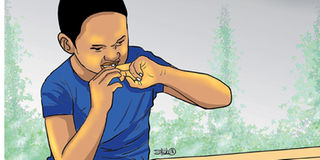Nail biting causes and what to do about it

What you need to know:
- Growing up can make kids anxious, and many of these tensions and pressures are invisible to parents. If your child bites moderately (doesn’t injure himself) and unconsciously (while watching television, for example), or if he tends to bite in response to specific situations (such as performances or tests), it’s just his way of coping with minor stress and you have nothing to worry about.
Your child may bite his nails for any number of reasons – curiosity, boredom, stress relief, habit, or imitation. Nail-biting is the most common of the so-called “nervous habits,” which include thumb-sucking, nose picking, hair twisting or tugging, and teeth grinding. It’s also the one most likely to continue into adulthood.
Growing up can make kids anxious, and many of these tensions and pressures are invisible to parents. If your child bites moderately (doesn’t injure himself) and unconsciously (while watching television, for example), or if he tends to bite in response to specific situations (such as performances or tests), it’s just his way of coping with minor stress and you have nothing to worry about.
In all likelihood, your child will eventually stop on his own, but if the nail-biting goes on longer than you’d like, or if it’s a habit you just can’t abide, there are simple ways to help him quit.
Address her anxieties
Our initial response when children do something that worries us is to try to stop the behavior, and that’s fine as a long-term goal. But before you can do that, it’s essential that you deal with the underlying causes of the behavior and think about whether there’s stress in your child’s life that you need to address.
If you have an idea about what might be making your child anxious – a recent move, a divorce in the family, a new school, or an upcoming piano recital – make a special effort to help her talk about her worries.
This is easier said than done for most kids, of course, but suggesting a patently ridiculous reason for the nail-biting (“I know! You’re trying to sharpen your teeth!”) may prompt her to tell you what’s really bothering her.
Don’t nag or punish. Unless your child really wants to stop biting his nails, you probably can’t do much about it. Like other nervous habits, nail-biting tends to be unconscious.
If your child doesn’t even know he’s doing it, nagging and punishing him are pretty useless strategies. Even adults have a terrible time breaking habits like this.
If the habit really bothers you, set limits. “No nail-biting at the dinner table” is as reasonable a rule as “no feeding the dog from your plate.”
The most important thing is to keep what’s basically a nuisance from escalating into a heated issue or becoming charged with emotion. Stifling your irritation for as long as you can and then snapping, “Stop biting your nails! I can’t stand it!” may turn out be the opening shot in a long and exhausting power struggle.
In general, as long as your child’s not hurting himself and doesn’t seem overly stressed out, your best bet is to keep his fingernails neatly trimmed, remind him to wash his hands often, and try to keep your attention focused elsewhere. If you pressure him to stop, you’ll just add to his stress and risk intensifying the behavior.
Moreover, any direct intervention on your part – such as painting nasty-tasting solutions on his fingernails – will feel like a punishment to him, whether you mean it that way or not. The less fuss he associates with the habit, the more likely he is to stop on his own when he’s ready, and the more likely he is to feel comfortable asking you for help.
Help her when she wants to stop. If your child’s friends are teasing her, she may be ready to stop – and she’ll need your help.
First, talk to her about the teasing and encourage her to tell you how it makes her feel. Reassure her that you love her no matter what her nails look like. Then move on to possible solutions.
Talk about breaking habits
Begin a discussion with your child about what nervous habits are and how it’s possible to break them. Next, decide how involved you should be in his plan to quit. Does he want you to remind him when he lapses, or will that irritate him? The older kids are, the less parental involvement they usually prefer.
Help her become aware of the habit. Encourage your child to become more aware of when and where she bites. Agree on a quiet, secret reminder for times when she forgets – a light touch on the arm or a code word.
Some kids benefit from physical reminders that call their attention to the habit the moment they do it. This option is helpful as long as your child is the one choosing to try it. If not, it will just seem punitive.




